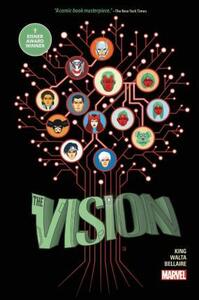Take a photo of a barcode or cover
This was just okay for me. I couldn't get into it. The art was fine, but I didn't connect with any of the characters. I didn't connect with the story either. There was a lot of 'Hey, check it out, here's our to be human! Don't you feel more human for having read this?! Are you questioning your existence yet?! Hello?! You still there?!' I had read a collection of the Runaways after binge reading Y: the last man, so it was nice to already know about Victor, but I still couldn't make myself care much about the story. It started to pick up about the time Virginia killed herself, but by then it was pretty much over. I dunno if I'll read the next volume.
Lavish illustrations, the storyline was a little confusing but I liked some of the questions raised. I'm actually interested in the storyline where Wanda invents their happy home but seeing Vision's version was still interesting.
Behold The Vision
It's indeed a great story about humans and their best and worst features as will, compassion, love , hate, revenge and sacrifices.
I love when writers write about a superhero who is less popular like: Vision here, and Hawkeye by Matt Fraction.
Recently, I read Pluto by Urusawa and it left me longing for a good touching story about robots.
It's indeed a great story about humans and their best and worst features as will, compassion, love , hate, revenge and sacrifices.
I love when writers write about a superhero who is less popular like: Vision here, and Hawkeye by Matt Fraction.
Recently, I read Pluto by Urusawa and it left me longing for a good touching story about robots.
A fascinating study on the nature of humanity and family from the perspective of synthetic humanoids who frequent the circles of superheroes and desire to be normal.
medium-paced
Plot or Character Driven:
A mix
Strong character development:
Yes
Loveable characters:
Yes
Diverse cast of characters:
Yes
Flaws of characters a main focus:
Yes
reflective
sad
medium-paced
Plot or Character Driven:
Character
Strong character development:
Yes
Loveable characters:
Yes
emotional
funny
tense
medium-paced
Plot or Character Driven:
A mix
Strong character development:
Yes
Loveable characters:
Yes
Diverse cast of characters:
Yes
Flaws of characters a main focus:
Yes
Tom King's The Vision is one of the best comics I've read in ages.
In Star Trek: The Next Generation Data made himself a daughter only, through no fault of his own, to lose her. Similarly, the EMH in Voyager made himself a holographic family only for it to end in tragedy. Both were held back by the limitations of 80s/90s television. In neither case is the lost daughter ever really mentioned again after the 40 minute story, nor are we able to get very attached. Tom King's The Vision tells a similar story, but with 12 issues is given much more time to marinate and explore the depths of the story.
The Vision made himself a family. We are not told how or why until late in the story, only that they are his own recent creations and that they were given false memories. He has a wife named Virginia and teenage twins named Viv and Vin. He moved into the suburbs with them and is trying to be normal to a degree, although there is an aspect where it feels like an affectation as though he is playing house. The narrator informs us that tragedy will strike and soon enough it does.
It's a story of immigrants and outsiders who are pressured to integrate their lives into society and yet are judged with suspicion if they do so, but it is also a story about justice and vengeance, about whether there's a number of times once can save that world at which the world owes them and the ability we have to destroy our own legacies in a moment.
It's a truly powerful and devastating tragedy in which we can feel everything fall apart and know that nothing will be done to stop it. There's a Shakespearean element to it, in which Vision's own tragic flaws bring about the undoing of everything he made even as we desperately hope it won't happen.
This is the other reason that it is much greater than those Star Trek episodes; because The Vision was wrong. He made godlike beings and then just assumed they would make noble and good choices and that everyone would accept them. He tried desperately, alongside his family, to fit in despite the greater depths he had to sink to to do so. Data and the Doctor are unable to be criticized in the same way the Vision is here, the risk that they won't be likable afterwards is not taken. This is willing to hold a mirror to and subvert a very old Marvel character in a way that is much more more meaningful than the brief turn to evil that we usually get.
In Star Trek: The Next Generation Data made himself a daughter only, through no fault of his own, to lose her. Similarly, the EMH in Voyager made himself a holographic family only for it to end in tragedy. Both were held back by the limitations of 80s/90s television. In neither case is the lost daughter ever really mentioned again after the 40 minute story, nor are we able to get very attached. Tom King's The Vision tells a similar story, but with 12 issues is given much more time to marinate and explore the depths of the story.
The Vision made himself a family. We are not told how or why until late in the story, only that they are his own recent creations and that they were given false memories. He has a wife named Virginia and teenage twins named Viv and Vin. He moved into the suburbs with them and is trying to be normal to a degree, although there is an aspect where it feels like an affectation as though he is playing house. The narrator informs us that tragedy will strike and soon enough it does.
It's a story of immigrants and outsiders who are pressured to integrate their lives into society and yet are judged with suspicion if they do so, but it is also a story about justice and vengeance, about whether there's a number of times once can save that world at which the world owes them and the ability we have to destroy our own legacies in a moment.
It's a truly powerful and devastating tragedy in which we can feel everything fall apart and know that nothing will be done to stop it. There's a Shakespearean element to it, in which Vision's own tragic flaws bring about the undoing of everything he made even as we desperately hope it won't happen.
This is the other reason that it is much greater than those Star Trek episodes; because The Vision was wrong. He made godlike beings and then just assumed they would make noble and good choices and that everyone would accept them. He tried desperately, alongside his family, to fit in despite the greater depths he had to sink to to do so. Data and the Doctor are unable to be criticized in the same way the Vision is here, the risk that they won't be likable afterwards is not taken. This is willing to hold a mirror to and subvert a very old Marvel character in a way that is much more more meaningful than the brief turn to evil that we usually get.




